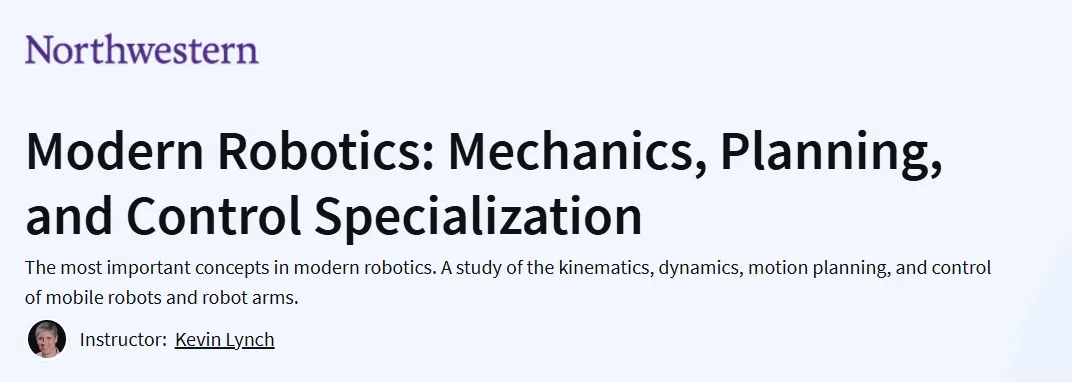What you will learn in Modern Robotics: Mechanics, Planning, and Control Specialization Course
Robot Motion Fundamentals: Learn the core concepts of robot configurations, degrees of freedom, and the configuration space (C-space) for motion analysis.
Kinematics: Understand forward and inverse kinematics, using the product-of-exponentials formula to solve for robot positions and velocities.
Dynamics: Study forward and inverse dynamics to understand the forces required for motion and control in robotic systems.
Motion Planning: Master techniques like trajectory planning, obstacle avoidance, and real-time feedback control for robotics.
Robot Manipulation: Explore the key techniques in robot manipulation, including grasping, handling, and using mobile manipulators.
System-on-Chip Design: Learn to design, program, and optimize robotic systems, including integration of soft-core processors and memory management.
Capstone Project: Apply the knowledge gained to develop a mobile manipulation task, combining both hardware and software in a real-world scenario.
Program Overview
Foundations of Robot Motion
⏳ 24 hours
Understand robot motion fundamentals and how robots interact with their environment.
Gain practical skills using Modern Robotics software and the CoppeliaSim robot simulator.
Robot Kinematics
⏳ 30 hours
Learn about forward kinematics, the product-of-exponentials formula, and spatial Jacobians used for robot arm configurations.
Robot Dynamics
⏳ 30 hours
Study forward and inverse dynamics and how they contribute to robot acceleration and force analysis.
Robot Motion Planning and Control
⏳ 31 hours
Explore motion planning in C-space, using graph search algorithms and feedback control techniques to optimize robot behavior.
Robot Manipulation and Wheeled Mobile Robots
⏳ 35 hours
Study manipulation techniques, grippers, and wheeled mobile robots to enhance system mobility and interaction with the environment.
Capstone Project – Mobile Manipulation
⏳ 20 hours
Develop a mobile manipulation solution that combines the theory and techniques learned in the previous courses. Use a simulator to complete real-world robotic tasks.
Get certificate
Job Outlook
Proficiency in robotics is valuable for roles such as:
Robotics Engineer
Embedded Systems Engineer
Control Systems Engineer
Robotics Software Developer
Skills acquired in this course are highly applicable in industries such as automation, healthcare robotics, aerospace, automotive, and consumer electronics.
Completing this specialization enhances your qualifications for advanced roles in robotics and automation, providing a pathway to a career in cutting-edge industries.
Specification: Modern Robotics: Mechanics, Planning, and Control Specialization
|
FAQs
- The course introduces foundational concepts but assumes some familiarity with linear algebra and programming.
- Beginners can follow along if they’re comfortable with basic mathematics and coding principles.
- Supplementary materials or refresher tutorials in math and programming may help bridge knowledge gaps.
- Active practice and exercises in the course help reinforce concepts for beginners.
- The course emphasizes theory, mechanics, and planning algorithms, which are foundational for real robots.
- Many principles can be applied in simulation environments or small personal robotics projects.
- Direct application to industrial or high-level robotics might require additional hardware experience.
- Projects and exercises in the course simulate real-world problem-solving scenarios.
- Python and MATLAB are commonly used in robotics simulations and assignments.
- Some exercises may require ROS (Robot Operating System) or similar simulation platforms.
- Familiarity with these tools will make following the practical modules easier.
- The course often provides starter code to guide learners through assignments.
- The course covers linear algebra, calculus, and differential equations applied to robot motion and control.
- Understanding these areas is important for mechanics, kinematics, and control algorithms.
- Prior exposure to these topics is recommended, but resources are often suggested for review.
- Assignments often focus on applying math concepts rather than purely theoretical proofs.
- Completing the specialization demonstrates knowledge of modern robotics concepts and control strategies.
- It can strengthen a resume for roles in robotics engineering, automation, and research.
- Networking and applying concepts in personal or open-source projects can improve employability.
- The course alone won’t replace hands-on industrial experience but serves as a strong foundation.





